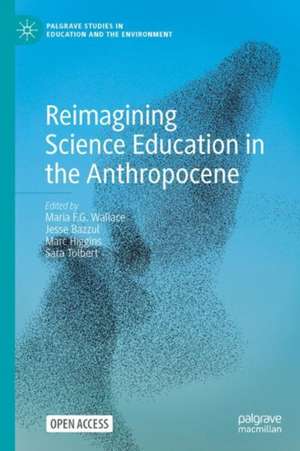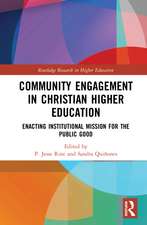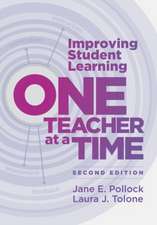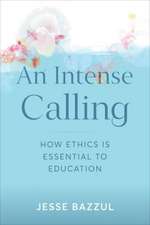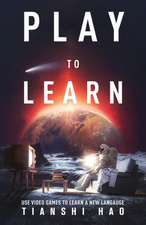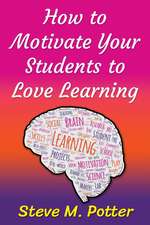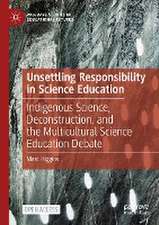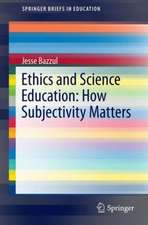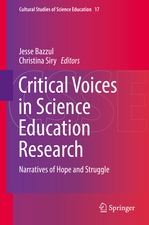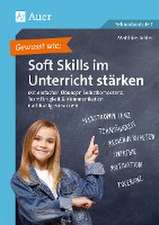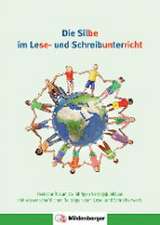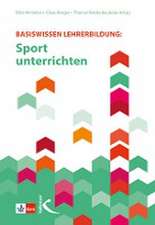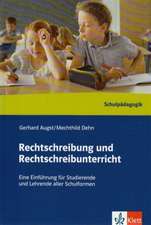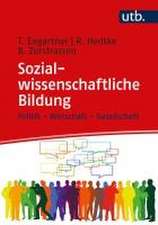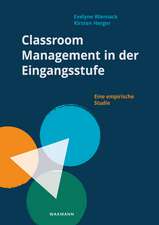Reimagining Science Education in the Anthropocene: Palgrave Studies in Education and the Environment
Editat de Maria F. G. Wallace, Jesse Bazzul, Marc Higgins, Sara Tolberten Limba Engleză Paperback – 8 dec 2021
This open access edited volume invites transdisciplinary scholars to re-vision science education in the era of the Anthropocene. The collection assembles the works of educators from many walks of life and areas of practice together to help reorient science education toward the problems and peculiarities associated with the geologic times many call the Anthropocene. It has become evident that science education—the way it is currently institutionalized in various forms of school science, government policy, classroom practice, educational research, and public/private research laboratories—is ill-equipped and ill-conceived to deal with the expansive and urgent contexts of the Anthropocene. Paying homage to myopic knowledge systems, rigid state education directives, and academic-professional communities intent on reproducing the same practices, knowledges, and relationships that have endangered our shared world and shared presents/presence is misdirected. This volume brings together diverse scholars to reimagine the field in times of precarity.
| Toate formatele și edițiile | Preț | Express |
|---|---|---|
| Paperback (1) | 283.21 lei 3-5 săpt. | +29.76 lei 6-12 zile |
| Springer International Publishing – 8 dec 2021 | 283.21 lei 3-5 săpt. | +29.76 lei 6-12 zile |
| Hardback (1) | 362.87 lei 3-5 săpt. | +37.53 lei 6-12 zile |
| Springer International Publishing – 8 dec 2021 | 362.87 lei 3-5 săpt. | +37.53 lei 6-12 zile |
Preț: 283.21 lei
Nou
Puncte Express: 425
Preț estimativ în valută:
54.20€ • 55.99$ • 45.08£
54.20€ • 55.99$ • 45.08£
Carte disponibilă
Livrare economică 27 februarie-13 martie
Livrare express 12-18 februarie pentru 39.75 lei
Preluare comenzi: 021 569.72.76
Specificații
ISBN-13: 9783030796242
ISBN-10: 3030796248
Pagini: 322
Ilustrații: XX, 375 p. 14 illus., 13 illus. in color.
Dimensiuni: 155 x 235 x 31 mm
Greutate: 0.56 kg
Ediția:1st ed. 2022
Editura: Springer International Publishing
Colecția Palgrave Macmillan
Seria Palgrave Studies in Education and the Environment
Locul publicării:Cham, Switzerland
ISBN-10: 3030796248
Pagini: 322
Ilustrații: XX, 375 p. 14 illus., 13 illus. in color.
Dimensiuni: 155 x 235 x 31 mm
Greutate: 0.56 kg
Ediția:1st ed. 2022
Editura: Springer International Publishing
Colecția Palgrave Macmillan
Seria Palgrave Studies in Education and the Environment
Locul publicării:Cham, Switzerland
Cuprins
1. Introduction.- 2. "Trees Don't Sing!... Eagle Feather Has No Power!" Be Wary of the Potential Numbing Effects of School Science.- 3. Tracing a Black Hole: Probing Cosmic Darkness in Anthropocenic Times.- 4. The Waring Worlds of H.G. Wells: The Entangled Histories of Education, Sociobiology, Post-Genomics, and Science Fiction.- 5. Creating Magical Research: Writing for a Felt Reality in a More-Than-Human World.- 6. Fire as Unruly Kin: Curriculum Silences and Human Responses.- 7. Redrawing Relationalities at the Anthropocene(s): Disrupting and Dismantling the Colonial Logics of Shared Identity through Thinking with Kim Tallbear.- 8. Decolonizing Healing through Indigenous Ways of Knowing.- 9. Still Joy: A Call for Wonder(ing) in Science Education as Anti-Racist Vibrant Life-Living.- 10. The Salt of the Earth (Inspired by Cherokee Creation Story).- 11. The Science of Data, Data Science: Perversions and Possibilities in the Anthropocene through a Spatial Justice Lens.- 12. Science and Environment Education in the Times of the Anthropocene: Some Reflections from India.- 13. Rethinking Historical Approaches for Science Education in the Anthropocene.- 14. Reflections on Teaching and Learning Chemistry through Youth Participatory Science.- 15. Learning from Flint: How Matter Imposes Itself in the Anthropocene and What That Means for Education.- 16. Resurrecting Science Education by Re-Inserting Women, Nature, and Complexity.- 17. Watchmen, Scientific Imaginaries, and the Capitalocene: The Media and Their Messages for Science Educators.- 18. Curricular Experiments for Peace in Colombia: Re-imagining Science Education in Post-Conflict Societies.- 19. A Feral Atlas for the Anthropocene: An Interview with Anna L. Tsing.- 20. In Conversation with Fikile Nxumalo: Refiguring Onto-Epistemic Attunements for Im/possible Science Pedagogies.- 21. In Conversation with Vicki Kirby: Deconstruction, Critique, and Human Exceptionalism in the Anthropocene.- 22. Conversations on Citizenship, Critical Hope, and Climate Change: An Interview with Bronwyn Hayward.- 23. Conclusion - Another Complicated Conversation.
Notă biografică
Maria F.G. Wallace is Assistant Professor at the University of Southern Mississippi, USA.
Jesse Bazzul is Associate Professor of Science and Environmental Education at the University of Regina, Canada.
Marc Higgins is Assistant Professor in the Department of Secondary Education at the University of Alberta, Canada, where he is affiliated with the Faculty of Education’s Aboriginal Teacher Education Program (ATEP).
Sara Tolbert is Associate Professor of Science and Environmental Education at Te Whare Wānanga o Waitaha University of Canterbury, Aotearoa New Zealand.
Jesse Bazzul is Associate Professor of Science and Environmental Education at the University of Regina, Canada.
Marc Higgins is Assistant Professor in the Department of Secondary Education at the University of Alberta, Canada, where he is affiliated with the Faculty of Education’s Aboriginal Teacher Education Program (ATEP).
Sara Tolbert is Associate Professor of Science and Environmental Education at Te Whare Wānanga o Waitaha University of Canterbury, Aotearoa New Zealand.
Textul de pe ultima copertă
“Situated in the era of the Anthropocene, this book volume recognizes the political urgency of re-envisioning science education with and for the community while dismantling the taken-for-granted deficit narratives of what science [education] is. Transcending disciplinary and geographical boundaries, the book calls us to reimagine science education in a more-than-human world, which places ecojustice, critical pedagogies, solidarity, and collectivity at the forefront.”
—Lucy Avraamidou, Associate Professor and Rosalind Franklin Fellow, University of Groningen, The Netherlands
“This inspiring collection showcases the kind of creative thinking-without-borders we would need to prepare our students to meet the challenges of the Anthropocene. It makes me wish I were back in grad school to begin my research career afresh with the help of the wonderful assortment of ideas, insights, and perspectives that this book so generously offers.”
—Ajay Sharma,Associate Professor, University of Georgia, USA
This open access edited volume invites transdisciplinary scholars to re-vision science education in the era of the Anthropocene. The collection assembles the works of educators from many walks of life and areas of practice together to help reorient science education toward the problems and peculiarities associated with the geologic times many call the Anthropocene. It has become evident that science education—the way it is currently institutionalized in various forms of school science, government policy, classroom practice, educational research, and public/private research laboratories—is ill-equipped and ill-conceived to deal with the expansive and urgent contexts of the Anthropocene. Paying homage to myopic knowledge systems, rigid state education directives, and academic-professional communities intent on reproducing the same practices, knowledges, and relationships that have endangered our shared world and shared presents/presence is misdirected. This volume brings together diverse scholars to reimagine the field in times of precarity.
Maria F. G. Wallace is Assistant Professor at the University of Southern Mississippi, USA.
Jesse Bazzul is Associate Professor of Science and Environmental Education at the University of Regina, Canada.
Marc Higgins is Assistant Professor in the Department of Secondary Education at the University of Alberta, Canada, where he is affiliated with the Faculty of Education’s Aboriginal Teacher Education Program (ATEP).
Sara Tolbert is Associate Professor of Science and Environmental Education at Te Whare Wānanga o Waitaha University of Canterbury, Aotearoa New Zealand.
—Lucy Avraamidou, Associate Professor and Rosalind Franklin Fellow, University of Groningen, The Netherlands
“This inspiring collection showcases the kind of creative thinking-without-borders we would need to prepare our students to meet the challenges of the Anthropocene. It makes me wish I were back in grad school to begin my research career afresh with the help of the wonderful assortment of ideas, insights, and perspectives that this book so generously offers.”
—Ajay Sharma,Associate Professor, University of Georgia, USA
This open access edited volume invites transdisciplinary scholars to re-vision science education in the era of the Anthropocene. The collection assembles the works of educators from many walks of life and areas of practice together to help reorient science education toward the problems and peculiarities associated with the geologic times many call the Anthropocene. It has become evident that science education—the way it is currently institutionalized in various forms of school science, government policy, classroom practice, educational research, and public/private research laboratories—is ill-equipped and ill-conceived to deal with the expansive and urgent contexts of the Anthropocene. Paying homage to myopic knowledge systems, rigid state education directives, and academic-professional communities intent on reproducing the same practices, knowledges, and relationships that have endangered our shared world and shared presents/presence is misdirected. This volume brings together diverse scholars to reimagine the field in times of precarity.
Maria F. G. Wallace is Assistant Professor at the University of Southern Mississippi, USA.
Jesse Bazzul is Associate Professor of Science and Environmental Education at the University of Regina, Canada.
Marc Higgins is Assistant Professor in the Department of Secondary Education at the University of Alberta, Canada, where he is affiliated with the Faculty of Education’s Aboriginal Teacher Education Program (ATEP).
Sara Tolbert is Associate Professor of Science and Environmental Education at Te Whare Wānanga o Waitaha University of Canterbury, Aotearoa New Zealand.
Caracteristici
This book is open access, which means that you have free and unlimited access Reconceptualizes science education in ways that center the concerns and interests of marginalized people Encourages multimodality in expression, including the use of pictures, graphics, multimedia, and different genres of writing
